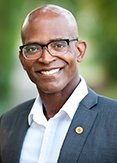Wayne Stephens, DDS, MBA has spent his career working to improve the lives of children. He cares deeply about health care equity, and to that end, he established the first pediatric dental specialty practice at a South Florida Federally Qualified Health Center. Most recently, he served as Jessie Trice Community Health System’s Director of Pediatric Dental Health and Wellness where he developed policies and strategies for improving oral health for children served in clinical settings and in school based health programs. Dr. Stephens advocates for addressing the challenges of systemic inequities through an intersectional lens. In this regard, he serves on the boards of Florida Health Justice Project and the Foundation for New Education Initiatives, non-profit organizations employing innovative approaches to structural problems.
Dr. Stephens is board certified in Pediatric Dentistry and he obtained his specialty training at Nicklaus Children’s Hospital. He graduated from Columbia University in 2010 after completing a dual degree program with the College of Dental Medicine and the Graduate School of Business. He is a recipient of the National Dental Association President's Award for Leadership as well as Columbia University College of Dental Medicine’s Dean's Award in Leadership. He is a former President of the American Student Dental Association. In 2017, the American Academy of Pediatric Dentistry chose him for their Samuel D. Harris Fellowship in Oral Health Care Policy
Learn more about The Joseph L. Henry Oral Health Fellowship in Health Policy Leadership.


